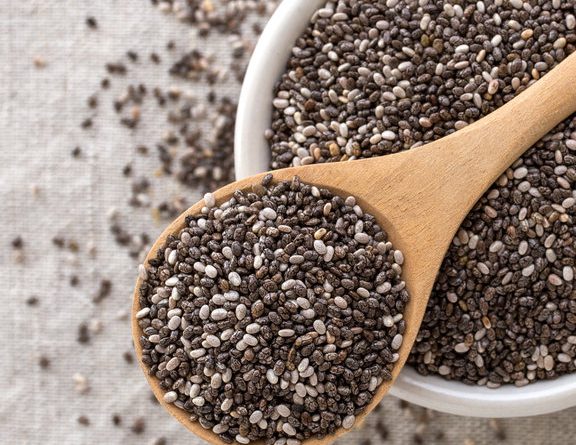7 Chia Seed Benefits You Probably Didn’t Know
chia seeds seem to be popping up in every grocery store, and on the menu of every hot brunch spot. What are they though? Well, Chia seeds may be small, but they’re incredibly rich in nutrients. Chia seeds, which are native to Central America, have long been touted as a superfood. They can be made into pudding, blended into smoothies or oatmeal, and even baked into bread! Not only are they versatile, but they’re chock full of health. What’s more, chia seeds are versatile and can be used in many recipes. Here are 7 health benefits of chia seeds.
They Can Help Fight Anxiety
Chia seeds are chock-full of an unsung nutrient hero, magnesium, which may help moderate cortisol, aka the stress hormone, levels. Another reason you want more of this mineral? Low magnesium levels are also associated with headaches and fatigue. Chia seeds are also high in tryptophan, an amino acid that can help your body produce serotonin, in turn, helping you fight anxiety and have more regular patterns.
They Can Help Your Skin Glow
These tiny seeds are packed with omega-3 fatty acids—a single serving contains more of some of these healthy fats than a serving of salmon. In addition to helping prevent heart disease, these essential fats strengthen your skin, hair, and nails. Omega-3 fatty acids also reduce inflammation and dryness and help preserve collagen, which means you will have an amazing glowy skin.
They Can Help You Feel Full Longer
Chia seeds are loaded with tons of micro- and macro-nutrients, including protein, fiber, fat, calcium, manganese, and tons more. They are also a great source of antioxidants. All of this makes them great for weight loss, heart health, and digestive health. The 11 grams of fiber and 4 grams of protein in a serving of chia seeds1 may be beneficial to weight loss by helping keep you fuller for longer. Plus, the seeds can absorb 15 times their weight in water, making them nutrient-dense fillers to add to your smoothies and baked goods. But don’t go overboard: Any more than the recommended serving and the fiber may start to upset your stomach.
They’ve Got More Calcium Than Milk
Just one serving a day packs nearly 18% of the daily-recommended amount of calcium1 (by weight, that’s more than milk), making chia seeds an excellent option for people who don’t consume dairy. We love chia seeds sprinkled on everything: yogurt, oatmeal, smoothies, smoothie bowls and made into a pudding. Getting enough calcium means stronger bones and teeth and healthy skin.
They Can Help Fend Off Free Radicals
Blueberries get a lot of praise for being high in antioxidants, but it’s time to give chia seeds their due. Antioxidants are essential for your health since they help your cells defend against free radicals. You can easily add them into your diet. You can add them to salads, sprinkle them on yogurt, throw them in your smoothies, and use them as a coating on chicken to make them feel breaded.
They Can Help You Recover Post – Workout
One of the few complete plant proteins, chia seeds pack a punch that can help your body bounce back faster after exercising. As a complete protein, they contain all of the nine essential amino acids that your body can’t make on its own. The various amino acids in protein are basically your body’s building blocks, they’re important for growing and repairing cells and tissues throughout your body. Exercise can cause tiny tears in your muscle fibers, and protein helps your tissue repair that damage to come back stronger.
They May Lower Your Risk of Heart Disease
Given that chia seeds are high in fiber and omega-3s, consuming them may reduce your risk of heart disease. Soluble fiber, the kind primarily found in chia seeds, can help lower total and LDL (bad) cholesterol in your blood. In turn, this can reduce your risk of heart disease. The omega-3 fatty acid in chia seeds has also been linked to decreased heart disease risk.

